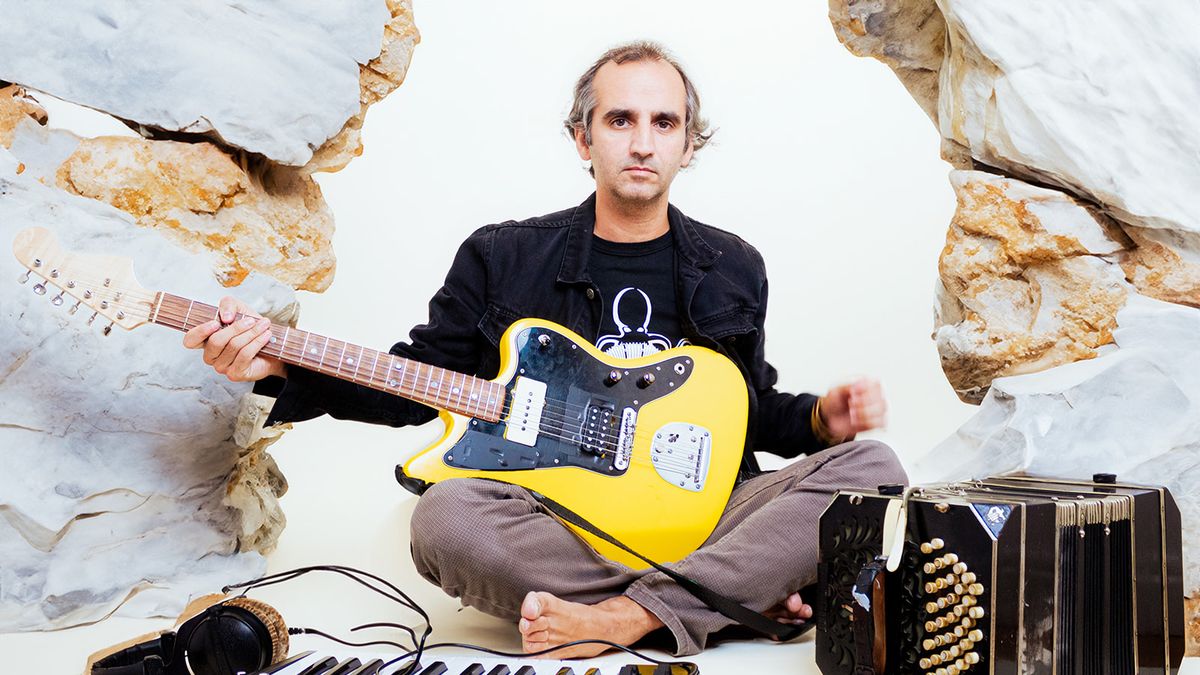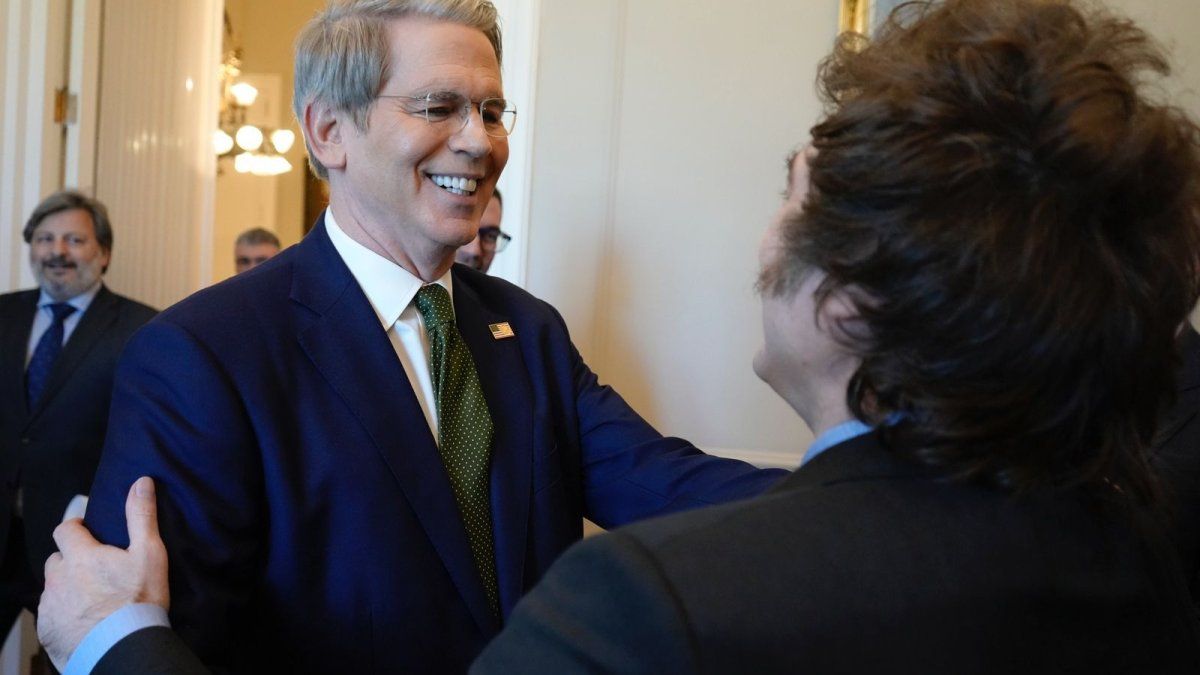“We have assumed that rock and blues are part of our culture but they are as foreign as reggaeton, waltz, polka or heavy metal. Another very different thing is what can already be done with AI, as a composer I see it a little askance and with distrust but it will surely become just another tool”, says the bandoneon player, guitarist and composer Pablo Gignoli, who presents his new album “After the storm.”
The prominent Paris-based musician presents his work alongside other musicians such as the drummer Fernando Samalea and letters of The Minister after his separation from the Fernández Fierro Orchestra. We talk with Gignoli.
Journalist: The album is called “After the Storm”, why?
Pablo Gignoli: There are different types of storms, meteorological, personal, economic, viral, political or spiritual, if we enter the metaphysical plane. I chose this title because of the song we composed with Flavio “The Minister” Reggiani because it seems to me to be a strong image that can always be present in people’s lives. We all face different storms or torments and that tests us to measure the inner strength to overcome them, both individually or as part of a group, of a society. Furthermore, it is very satisfying when the storm passes but it should also leave us with some lessons to be prepared for future climatic furies.
Q: What doors were closed that you wanted to open on this album?
PG: I have a song on an album by my TAXXI Tango XXI orchestra called If you open that door that says “If you open that door, think about it, something may come out that you don’t know today…. All the impulses of your skin will flourish if you open your heart today.” It’s a bit like that idea, it’s like walking along a hallway, a PH and having the possibility of opening the doors of those other people’s houses but that instead of being foreign, they are yours and in my case, I have been walking down the tango aisle for a long time, as a bandoneon player, modern, classical, electronic, suddenly I decided to show my guitarist, singer, keyboardist self, show the arrangements from another place and project myself towards a larger, more eclectic place and take charge of my varied interests.
IMG-20241024-WA0061.jpg
Q.: You say that the national rock of Spinetta, Charly or Fito influenced you. How is that national rock today?
PG: Yes, obviously, the three artists always left us very direct elements of tango or folk music. Los Redondos also left tango colors implicit in many of their songs, which when decanted transformed into what happens today in many artists of my generation. In this album I did not consider whether it should be tango or rock or pop or jazzy, the songs simply come out with the influences that exist, although you decide how far or where things go. As for how that national rock is today. It’s perfect. Obviously there are always new trends but with the development of technology and communication beautiful things happen. My daughter is 16 years old, she was born in Buenos Aires but has lived in France for 13 years, but a while ago I discovered that she was listening to Los Abuelos de La Nada. Now he is flashing with Ceratti, he loves him and the other day we went to see the movie “Puan” and we came out singing “I am not a Stranger” and he never told me that he knew all that! But she also listens to the French rap that belongs to her generation with the same passion that she likes Pink Floyd, The Beatles, Chopin and Bossa Nova.
Q: How do you see the pop and trap music that dominates today? Those lyrics about brands, cell phones, social networks and sex. Where was the poetry of Spinetta and the rockers of the 70s and 80s?
PG: Like everything in life, there are things done well and things done poorly. For a product to go on sale and be of mass consumption, it has to have a quality standard of a certain level, so from the start there is a lot of work to get there and that already has its own value. Each generation sings what it needs and in the big cities, where this urban music comes from, what we have attached to all our senses is excessive consumption so it is not strange that the message passes through there. The interesting thing is that this is in a critical way. Obviously if you live in the middle of the countryside you are going to sing about other things, other values. I always particularly liked rap, in fact in my early adolescence I was a rapper, I even took a few steps. The original rap, the break dancing, they’re great. We have assumed that rock and blues are part of our culture but they are as foreign as reggaeton, waltz, polka, heavy metal or whatever you can think of. Another very different thing is what can already be done with AI, I have not gotten into it and as a composer I see it a little askance and with distrust but it will surely become just another tool, as the flute once was. added to the singing, the patch that added to the clapping, the piano synthesized an orchestra.
Q: What is life like in Paris?
PG: Paris is a very large, intense, very expensive, very touristy, quite frenetic, very cosmopolitan and multiracial city. The reputation of bad vibes that Parisians have is well earned. Beyond that I try to live as well as possible, always planning things with my duo, Volco & Gignoli, together with the pianist Sebastian Volco and the TAXXI Tango XXI orchestra with which I plan to record a new album of modern and combative tango in the coming months . Here I had the chance to work with people like Benjamin Biolay, where I personally met Fernando Samalea, with the legendary Catherine Ringer, icon of French psychedelic rock and also with the former Gotan Project, Mueller and Makaroff.
Q: You are going to India, what do you plan there?
PG: I’m going to India for the second time in March to an incredible city, outside of any normal concept, called Auroville, which is located in the South-East of India. There I’m going to play at a Tango Festival that has been taking place for some time. years with the pianist Pablo Montanelli and the singer Sandra Rumolino. We are going to do some concerts and singing and dance workshops. I also have a couple of invitations to travel to share our culture in other cities. There is something they told me there that surprises me enormously and that is that I am the first bandoneon player (at least a milonguero player) who is going to play in La India. It sounds very strange to me but of course it is a small pride.
Q: How do you get along with Spotify as a creator?
PG: It is a necessary evil. Spotify has a large part of the monopoly on music distribution and there are few other channels to upload music to the internet. In the past it was very difficult to produce music that sounded good and edit it. With these new possibilities, many more people have that opportunity, but that also means that many very good things are lost in the ocean of information. Furthermore, not all people have a Spotify subscription so it is not free and useful for everyone. Yes, it is good to have a channel where you can publish your work in such a simple way, so I am not complaining, but it is good to warn people that digital platforms pay artists very poorly.
Source: Ambito
David William is a talented author who has made a name for himself in the world of writing. He is a professional author who writes on a wide range of topics, from general interest to opinion news. David is currently working as a writer at 24 hours worlds where he brings his unique perspective and in-depth research to his articles, making them both informative and engaging.




